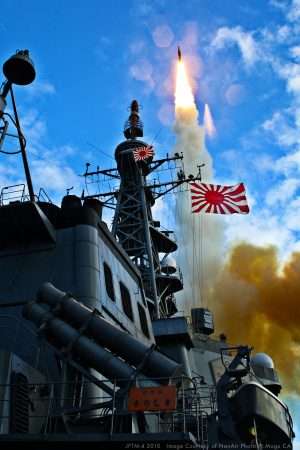Japan is in a state of heightened vigilance following North Korea’s alleged intercontinental ballistic missile (ICBM) test, which saw the missile fall into Japan’s Exclusive Economic Zone (EEZ). Chief Cabinet Secretary Matsuno Hirokazu called last week’s ICBM “different in dimension from the series of previous missile tests.” He stated that “North Korea does not appear to have changed its intention to pursue long range ballistic missiles” and warned of further possible provocations.
On March 24 North Korea announced the “successful launch” of a newly developed monster ICBM, called the Hwasong-17. It’s seen as a “significant milestone” in the marked acceleration of its nuclear-capable missile development, although both South Korea and the U.S. have questioned whether the missile launched last week was the Hwasong-17 or the older Hwasong-15. According to North Korea, the missile traveled a distance of 1,090 kilometers and flew at an altitude of 6,000 km, which is higher than the Hwasong-15 ICBM launched four years ago.
North Korea’s missile development has been 30 years in the making and escalation doesn’t appear to be slowing down. The latest succession of tests, including a record-setting number of launches in January 2022, has sparked fresh fears that North Korea is reaching the final stage of missile development and is preparing an attack on the United States and its neighboring allies.
The Japanese government said it will work closely with the U.S. and its allies to monitor the situation and will collect and analyze information. Japan says it will also develop a strategy to prevent further provocation from North Korea. But with the Kim Jong Un regime continuing to fund its weapons development program despite U.N. and U.S.-led sanctions that were designed to cut off North Korea’s sources of income, there is little room for further sanctions.
What’s more, international pressure on North Korea’s nuclear missile development has taken a backseat amid various international conflicts. Japan’s Minister for Foreign Affairs Hayashi Yoshimasa believes that North Korea is taking advantage of the “gap” created by the international community’s preoccupation with Russia’s invasion of Ukraine.
Japan is facing a precarious security situation. Russia’s growing isolation in the international community is at odds with any further efforts to impose sanctions on North Korea. Russia, which has long stood against dialing up pressure on North Korea, can use its veto power in the U.N. Security Council to block sanctions, as can North Korea’s ally, China. To add to Japan’s regional problems, Russia has also started military drills on disputed islands claimed by Tokyo in reaction to Japan joining U.S.-led sanctions against Russia over the war in Ukraine.
Russia’s aggression in Ukraine has shined a light on the importance of national defense capabilities. Japan’s Aegis missile defense system is expected to be deployed to intercept a ballistic missile should the need arise. But North Korea’s escalating military capability will undoubtedly reignite wider discussion on the state of Japan’s defense capabilities as the government plans to revise the National Security Strategy by the end of the year.
On a diplomacy front, getting North Korea to abandon its missile development would require a new level of deterrence or global alliance. One under-explored avenue is cooperating further with South Korea on the issue and forging a stronger alliance with Japan’s closest neighbor. Lingering tensions over historical issues have thus far prevented closer cooperation, with relations entering a deep freeze in 2018 after a Korean court ruled that Japanese companies owed compensation over forced labor during Japan’s colonial rule over Korea.
Last week South Korea’s President-elect Yoon Suk-yeol called for urgent efforts to restore ties with Japan and for trilateral cooperation between South Korea, Japan, and the U.S. so that “North Korea will have conviction that there’s nothing to gain from nuclear weapons.” Yoon is a conservative who is said to align with a more traditional U.S. alliance and is likely to push for hardline denuclearization, as opposed to the current administration’s strategy of taking a mediator position between North Korea and the United States.
South Korea and the United States have dismissed the latest missile launch, reporting that the ICBM was the less powerful Hwasong-15 based on images of the number of engine nozzles, among other details. Japan, on the other hand, has not changed its analysis. It believes the ICBM had a flight capability of over 15,000 km, which indicates a new class of missile that could reach as far as Washington, D.C. Matsuno reiterated Japan’s position has not changed as the provocation is a “serious threat to the peace and security of our nation, region and the international community.”
In 2017 residents in northern Japan woke up to a J-Alert warning them to take shelter as a North Korean ICBM flew over the country. Japan now faces a dangerous new reality where the omnipresent threat of North Korea has become far more palpable.
































